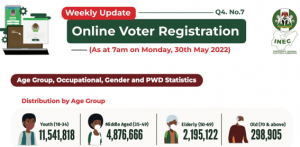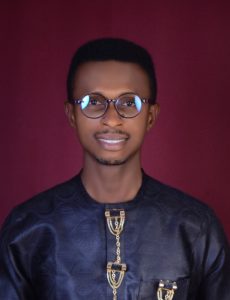The Nigerian political landscape is fast unfolding and the political gladiators will soon beat and sound their drums to commence their campaigns. Surprisingly, a large number of our youths are yet to be swayed by these. They engage more in social than political discourse and the contents these youths push on a daily basis tilt towards social appeal than political engagements.
For instance, the election year 2023 beckons and the state of the nation requires that young people, who constitute a greater part of the electorate should begin to have issue-based discussions on the best ways to engage politicians in rigorous debates on the execution of their campaign manifestoes and how it would affect citizens positively. Regrettably, that’s likely not to happen because these youths would rather prefer jumping on the trending Kizz Daniel’s BUGA dance challenge than focusing on critical political issues.
One then begins to wonder; what must have informed this? Why do our youths participate more in social than political discourse? Well, this is the vital question this essay seeks to answer. It carefully examines the issues around it while making necessary observations and suggestions.
But then, the essay does not limit political participation to just issue-based discussions. Rather, it considers a wider interpretation of political participation to include voting, political party activities, and taking part in civic responsibilities and how these have a nexus with the participatory approach of the Nigerian youths. With this interpretation, the essay investigates why some youths in Nigeria show apathy towards political participation. It is anticipated that the result will provoke the needed voluntary political engagements and interest in the youths.
Some Developments
Just recently, there were a lot of talking points given the intense horse-trading that characterized the presidential primary elections of the two leading political parties in Nigeria. However, such discussions would never caress the fancy of most Nigerian youths. It would never trend amongst them.
Now, ponder on this little research carried out.
On my Whatsapp status, each day I posted verified events scheduled for the 2nd of June, 2022.
On the first day, my status update read,
“The Independent National Electoral Commission (INEC) invites stakeholders, especially the youths to participate in a discussion on ‘Youth Participation in the Electoral Process.’ Date: Thursday, June 2, 2022. Time: 8pm – 10pm. Venue INEC Twitter Spaces, #INECExtendPVCDeadline” [1].
While the next day, it read,
“#BBNaija Shine Ya Eye Reunion is here at last. Catch up on the gbas gbos from June 2, 2022. Time: 10:30WAT every weekday! 9pm/9:30pm WAT Saturdays/Sundays, #BBNaijaReunion”
Now, guess what?
Within 30 minutes, close to a hundred views and engagements on the #BBNaija update were recorded, with many asking for the DSTV and GoTV channels that would broadcast the show. Those enquiries were all from youths. Nobody showed interest in the INEC stakeholders’ discussion on youth participation in the electoral process. The same updates were posted on my Twitter timeline and the response didn’t follow a different pattern either. Tweet analytics recorded greater impressions and engagements for the #BBNaija Reunion tweet than the INEC’s stakeholders’ discussion tweet.
Even when some youths are involved in political discussions, it is rarely issue-based or constructive. For example, many uninformed youths especially on social media have abandoned conversations about the qualities, antecedents and capacities of election candidates to jump on the campaign of hate, ethnoreligious abuse and deceit through unverified and malicious information they push on their timelines. The corny chants of politicians seeking to divert the attention of these impressionable young minds from the crucial issues that require intense scrutiny have not helped matters either.
In another development, a 50 seconds video on Instablog showing a celebrity scandal involving singer, Oxlade or Tiwa Savage will drive a faster and insane internet traffic amongst the youths than the news of INEC’s extension of the continuous voter registration exercise. This is just the truth!
Who remembers the dancing senator?
He is Senator Ademola Adeleke, a legislator from Osun state. Take a survey today and you’d notice that majority of the youthful electorates who “vibed” to his dance moves during his governorship election campaign did not realize he later lost the election. Many of them cannot explain the back and forth of the 2018 Osun polls that led to the inconclusive election and the subsequent supreme court’s affirmation of the candidate of the All Progressives Congress (APC) as the winner.
With these developments, there is no gainsaying the situation is dire and it requires a careful examination. Nigerian youths truly enjoy social contents than having to participate in political engagements and they are pretty unapologetic about it.
A Brief Walk Down Memory Lane
In the years leading to independence in Nigeria, the country witnessed youths being the driving force behind the eventual ouster of the colonial masters. This means that our history as a country cannot be complete without citing the pivotal roles youths played in achieving our independence.
The activities of nationalists like Anthony Enahoro, Herbert Macaulay, Nnamdi Azikiwe, Tafawa Balewa, Obafemi Awolowo, and others in the struggle for Nigeria’s independence were never to be forgotten in a hurry. They were all youths and they used their platforms to speak against the ills of colonialism. Nnamdi Azikiwe’s Zikist movement and The West African Pilot readily comes to mind in this regard. The doggedness and resolve of these youths later became what heralded Nigeria’s Independence from British colonial rule in the year, 1960.
The Paradigm Shift
Today, Nigerian youths are fast becoming disinterested in any political process. The outcome is that political activism in Nigeria is characterized by old politicians who are always recycled in office.
With global political conversations shifting toward youth participation in politics, one wonders how this can be possible in Nigeria given that young people rarely engage in political discussions and activities. Most of them are rather concerned about hitting 1Million followers on Instagram and then throwing a party to celebrate the milestone. Very few belong to youth-oriented forums and stakeholders’ meetings that discuss emerging political issues in the country.
What then could be the Leading Causes?
The following pose ongoing barriers to driving the interests of young people in political discourse in Nigeria.
Mobilization of funds to qualify them for representation is one barrier. Recall that the APC, Nigeria’s ruling political party had their nomination forms at outrageous amounts. TheCable reports that the party’s cost of nomination forms was as high as N100million (USD240,884) for Presidential aspirants, N50million (USD85,470) for governorship aspirants, N20million (USD34,188) for the Senate, N10million (USD17,094) for the House of Representatives and State Assembly forms at N2million (USD3,418) [2].
Also, the leading opposition party, the People’s Democratic Party (PDP) pegged N40million (USD68,376) for Presidential aspirants, N21million (USD35,897) for governorship aspirants, N3.5million (USD5,982) for the Senate, N2.5million (USD4,273) for the House of Representatives and N1.5million (USD2,546) for state house assembly aspirants [2].
Very few Nigerian youths can pay these sums and, since party hierarchies usually prefer older candidates on whom the chances of winning are believed to be high, young people become disenfranchised. This is why Davido would sing, “if you no get money, hide your face.” Yes! hide your face.
Further, President Buhari lacks proper youth representation in his cabinet, likewise the national assembly in its hallowed chambers. This is an indictment on these arms of government under whose administration the “Not Too Young To Run Act” came to be. The “age reduction Act” was meant to encourage the youths and drive their interests in politics. Unfortunately, the reverse is the case.
Also, obsessed with the leadership deficits of past leaders which do not impact positively on the lives of common people, and given the continued existence of poverty amidst plenty, some Nigerian youths lose interest in political participation.
The lack of meaningful communication amongst some old politicians gets in the way of effective youthful participation. During election campaigns, the gutter language used by these politicians on their platforms is disgusting and smacks of desperation. This creates further discouragement on the part of the youths.
Digital authoritarianism is another factor that contributes to youth’s aloofness in political participation in Nigeria. The leadership seemingly wants to determine for the citizens what views of the internet they must have. The Nigerian government had had several legislations in response to perceived concerns about the internet and social media use. An example is the “Anti-social Media Bill 2015” and the infamous “Protection Against False Accusations Decree” known as Decree 4 [3][4]. These policies somewhat gag online expression and stifle dissenting opinions, thereby creating an atmosphere of fear and passiveness amongst the youths.
Political hooliganism characterized by killing, maiming, kidnapping and assassination has equally contributed to the withdrawal and apathy of some youths in political discourses [5]. The electioneering period in Nigeria is often a tense one, especially with the terror of unknown gunmen carrying out clandestine activities. The bizarre incident in Anambra state, where the severed head of its lawmaker was hung in a public place leaves a lot of apprehensions and this makes the youths distant from political participation.
The Need to Change the Narrative
Vanguard publication of January 16, 2022, reveals that over 33.6 million Nigerians aged between 15 and 35 represent 16.8% of the total population [6]. Also, according to the world population dashboard of 2022, Nigeria has a total population of 216.7 million [7]. Of this number, the percentage aged between 0 and 14 is 43% [7]. This means that Nigeria’s population is young since over 50% (i.e., 16.8% + 43%) of the country’s population comprises young people below the age of 35. Unfortunately, this is a huge demographic dividend that is yet to be exploited because the nature of politics in Nigeria acts as a deterrent to driving political interests and participation amongst Nigerian youths.

Figure 1: INEC online voter registration distribution by age group as of 7 am, 30th May 2022 [8][9]

Table 1: INEC online voter registration distribution by age group as of 7 am, 30th May 2022 [8][9]
Figure 1 above shows INEC voter registration distribution by age, extracted from INEC’s website as of 7 am on May 30th, 2022. The table was obtained from the figure to ease understanding. Now, of the 18,912,511 total registered voters, over 60% of the registered voters are youths. With this, it is safe to say that whomever the youths decide to vote for is sure of winning the election. But this will never be possible if the youths decide to stay aloof and refuse to participate in political activities.
Here Are Some Suggestions for Changing the Narrative
The Role of Celebrities and Influencers: Indeed, youths participate more in social than political activities. For this reason, they easily relate well with celebrities who oftentimes have no less than 2Million followers on their social media pages who are mostly the youths. Now, these celebrities should begin to engage these youths positively towards political participation. They can drive campaigns to arouse their interests. Popular comedy skit maker, MrMacaroni is doing a beautiful job on Twitter in this regard, likewise, Falz the Bahdguy a Nigerian rapper. On his verified Twitter handle @falzthebahdguy, the latter disclosed that he has decided to hold a free concert on the 11th of June, 2022 and has revealed admission ticket to the show will be the Permanent Voters Card (PVC) or temporary voters slip. He went further to say that those who don’t have any of these can register at the venue [10]. Now, this is the way to go, and other celebrities and influencers should borrow a leaf from him.
Digitization of Voting: Since it has been identified that the majority of Nigeria’s internet users are young people [11], the need to introduce electronic voting into the electoral process becomes imperative. This will also discourage apathy amongst the youth as voting will just be a click away.
Language of Communication: When communicating policies, politicians and government should be critical of tone and style. They should avoid languages that have condescending and authoritarian tones. This is because young people are quick to be irritated with information that doesn’t embody the proper tone and style. Inappropriate use of language can be counterproductive and discourage young people from sharing and engaging with political content. For instance, when engaging youths who do not believe their votes count during elections, the right language must be used to persuade them to go pick up their PVCs or get registered with INEC.
The Need for Adequate Security: As the Nigerian political space is not safe, the government at all levels must put in place adequate security of lives and property. This will reduce the tension in the country because it is only in an atmosphere of safety that political participation can be fostered. No youth will likely come out to vote on election days if the safety of his or her life is not guaranteed.
Innovation is Key: Innovation should begin to drive political activities in Nigeria. With innovation, the youths have demonstrated the capacity to play crucial roles in making landmark achievements in business and other sectors of the economy. However, on the political front, Nigerian politics has remained hostile to the youths. Innovation will make political parties open to new and fresh ideas that will encourage the youths to participate in political processes. This can only be possible when political leaders realize that youth-led efforts often lead to promising outcomes. Political parties are therefore advised to exploit this advantage accordingly and encourage contributory participation from young people in democratic processes and practices.
The Role of Advocacies: Youth-oriented movements, civil society groups and community organizations must take the advantage of the “Not Too Young To Run Act” to inspire political inclusion of the youths. These umbrella bodies should begin to drive aggressive advocacies to open up the space for increased youth participation in political discourse and activities. The media, both electronic and print, should get involved in these advocacies. They can do this by reducing the money they charge for political jingles and advertorials that support youth inclusion in politics.
Conclusion
The youths are not entirely to blame for their aloofness in political participation due to several factors already identified as leading causes in this essay. But then, the outcome is that political activism is left in the hands of the old politicians. In other words, there is a lack of representation from the youths on the political front due to a lack of interest.
However, young people must rise to the occasion and take their destinies into their own hands. Realizing that the numbers are in their favour, Nigerian youths can begin to get actively involved in political activities and then demand inclusive participation.
One of the best places for them to do this is the internet; and in particular, social media. Social media can change young people’s political outlooks and participatory behaviour if exploited properly. This is because it is where they can be mostly found as there is hardly a Nigerian youth who doesn’t own a smartphone and has a social media handle.
Nigeria with a population put at 216.7 million [7] with about 60% registered voters as youths [7], and the distribution of social media audience from age 13 to 34 placed at 79.9% of the total population according to statista.com [11], the youths can begin to define the political trajectory of Nigeria for good. They should desist from staying aloof because the power to change the ugly narrative is already in their own hands. They must take the initiative now! Yes, they must!
References
[1] https://www.inecnigeria.org/resources/press-release/ (accessed June 1, 2022, @10:00hrs) [2] https://www.thecable.ng/political-party-nomination-fees-and-the-shrinking-political-space/amp (accessed May 31, 2022, @10:05hrs) [3] https://techeconomy.ng/2021/11/digital-authoritarianism-in-nigeria/ (accessed June 7, 2022, @23:05hrs) [4] https://cmonionline.com/2022/04/24/digital-authoritarianism-in-nigeria-by-chukwuemeka-oluka/ (accessed June 7, 2022, @23:05hrs) [5] https://www.davidpublisher.com/Public/uploads/Contribute/5f73fa646aac1.pdf (accessed June 8, 2022, @15:00hrs) [6] https://www.vanguardngr.com/2022/01/why-we-should-drive-it-home-for-the-nigerian-youth/amp/ (accessed May 31, 2022 @23:30hrs) [7] https://www.unfa.org/data/world-population/NG (accessed June 5, 2022, @23:05hrs) [8] https://cvr.inec.gov.ng (accessed June 5, 2022, @18:00hrs) [9] https://cvr.inecnigeria.org (accessed June 5, 2022, @18:00hrs) [10] https://twitter.com/falzthebahdguy (accessed June 7, 2022, @23:05hrs) [11] https://www.statista.com/statistics/1176100/distribution-social-media-advertising-audience-nigeria-age-gender/ (accessed June 5, 2022, @23:08hrs)
About the Writer

Chukwuemeka Oluka writes in from Enugu, Nigeria. He is a passionate writer, a research enthusiast and a graduate of Electronic and Computer Engineering from Nnamdi Azikiwe University, Awka. He tweets @mekus_oluka and can be reached via “write2oluka@gmail.com”






